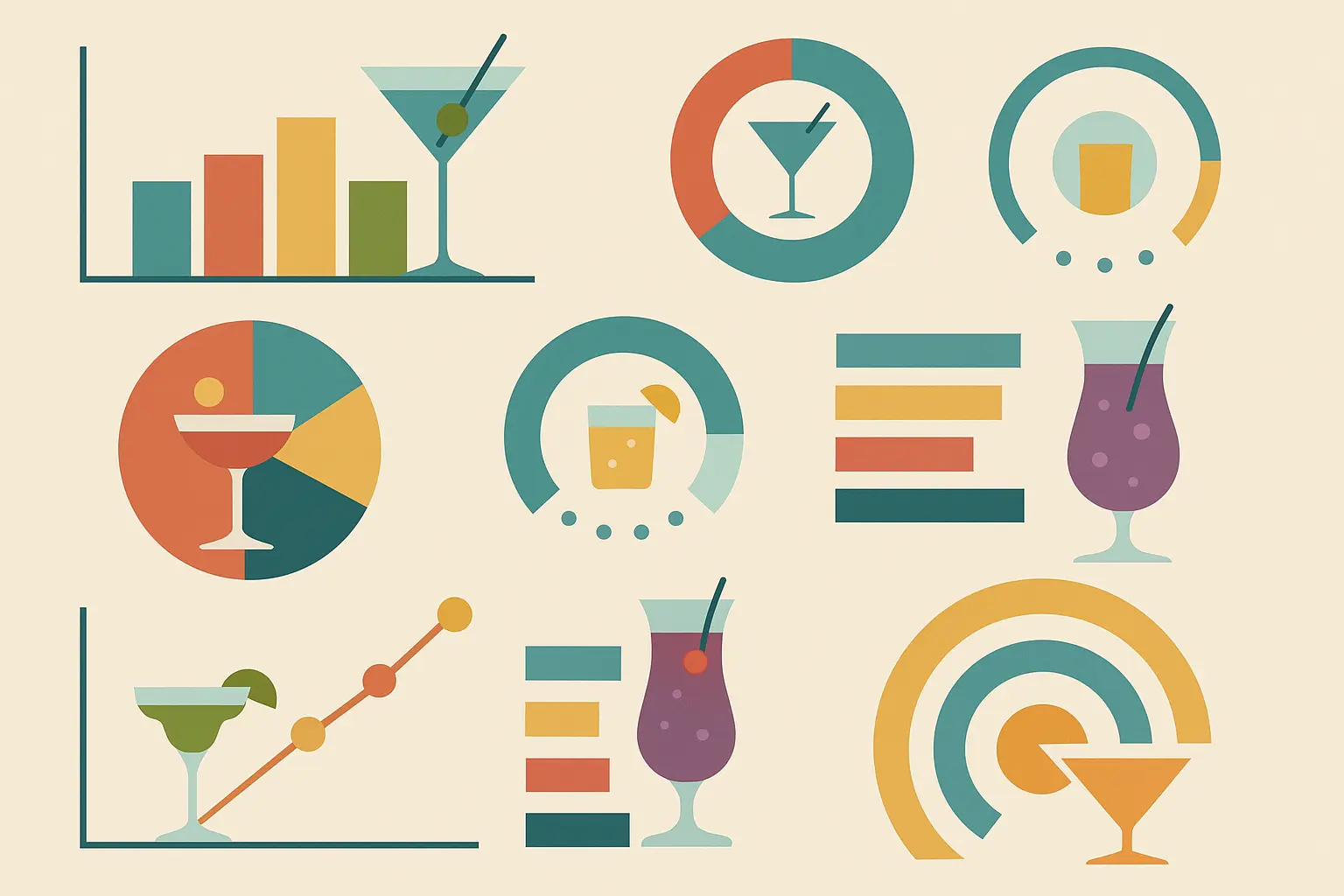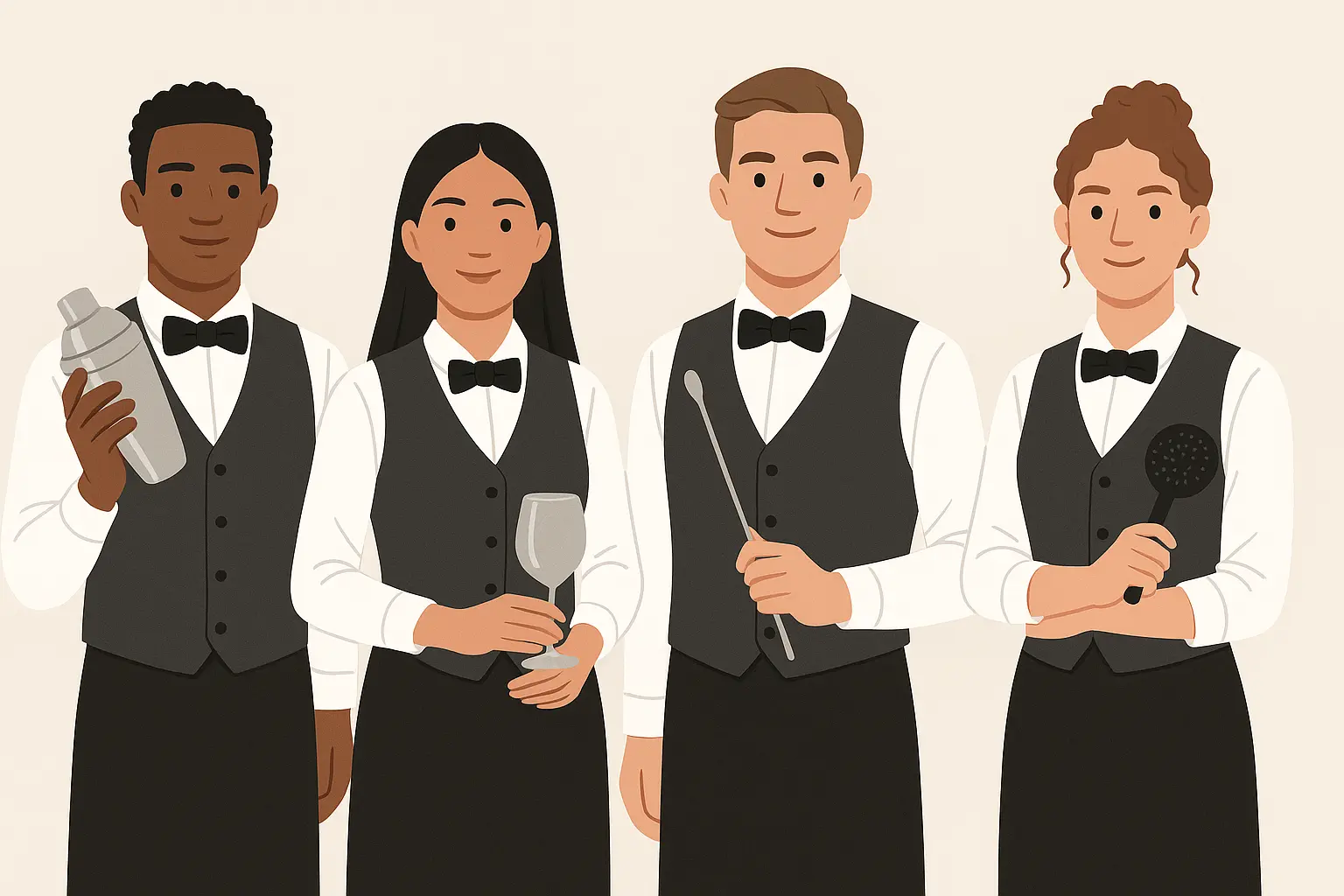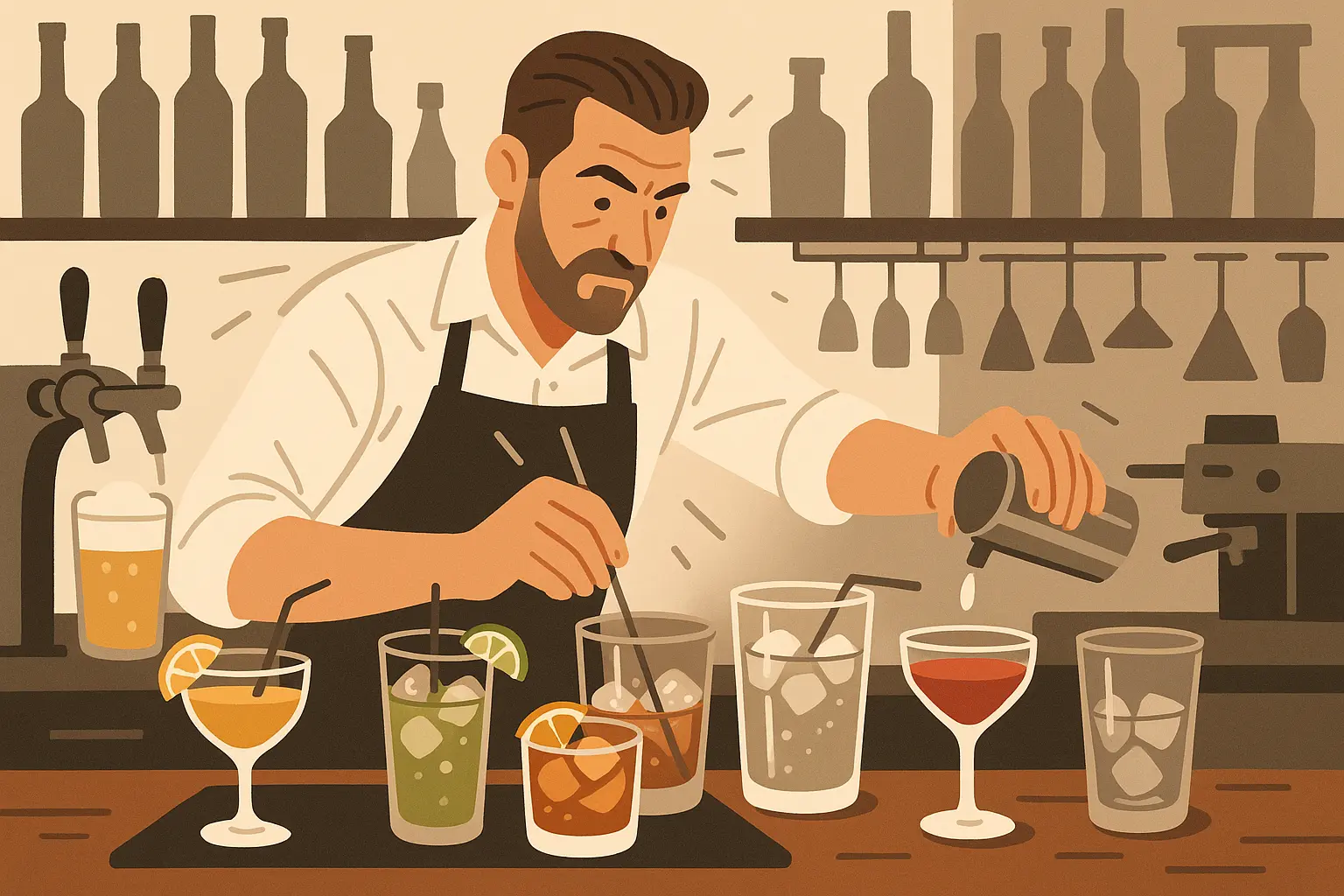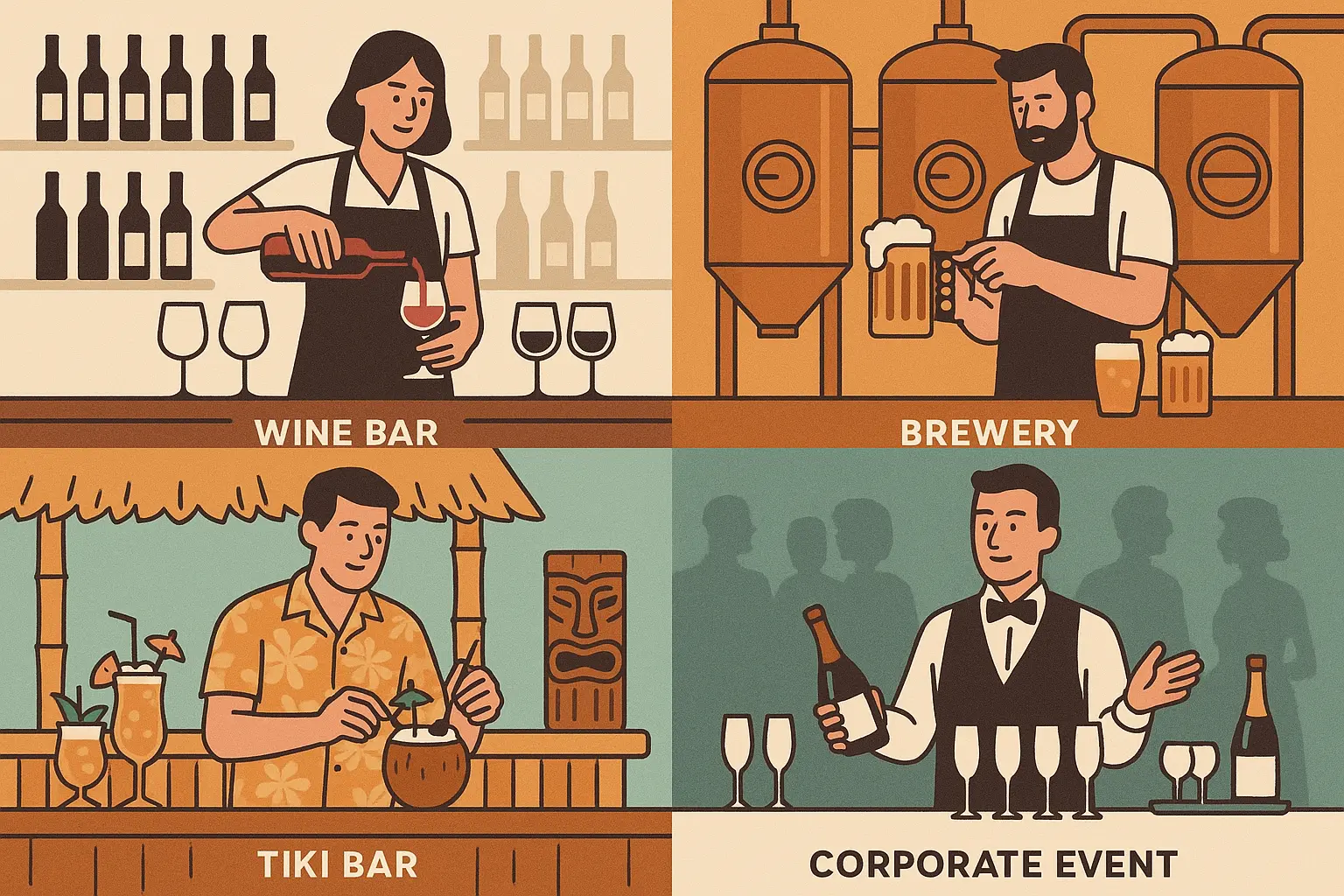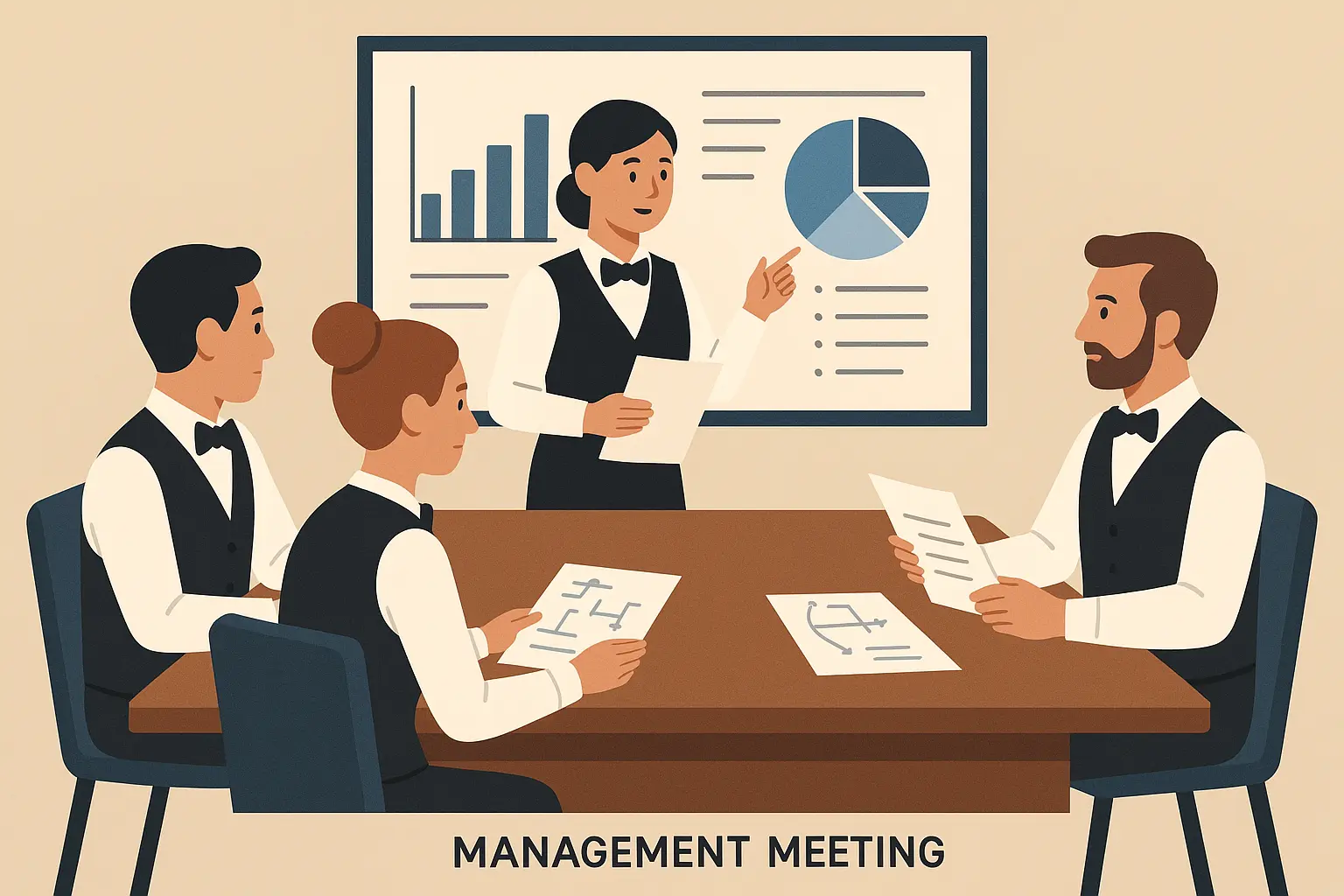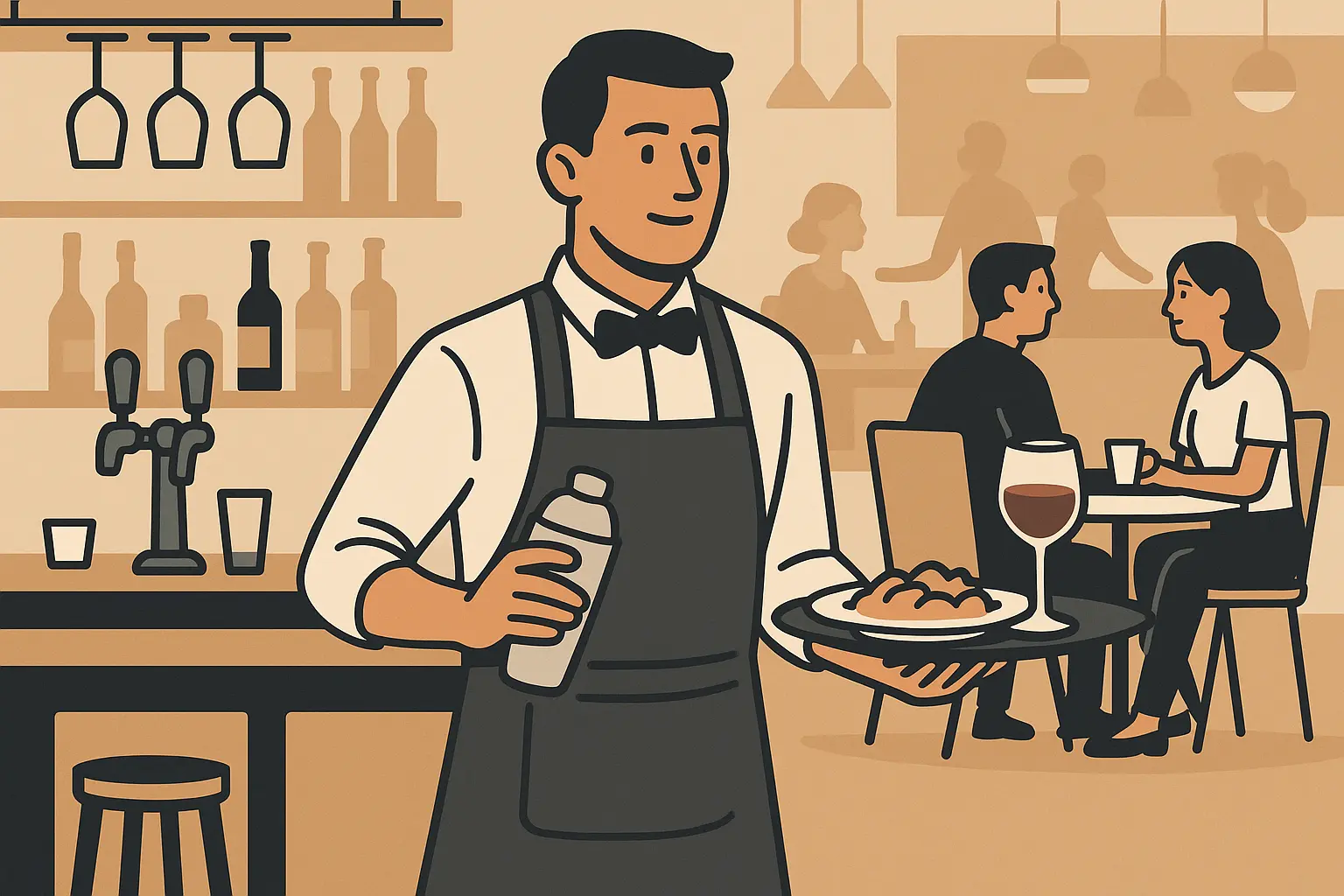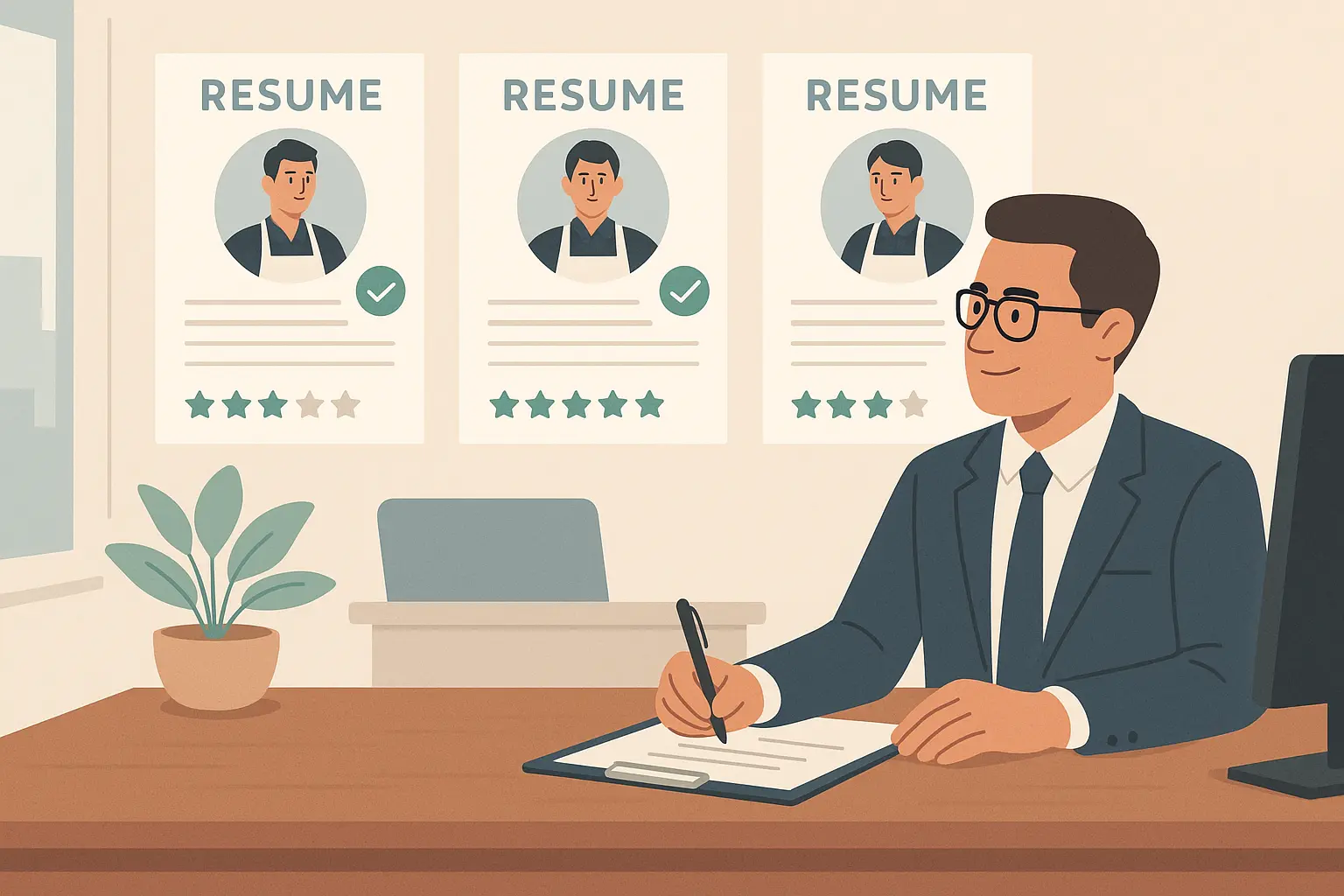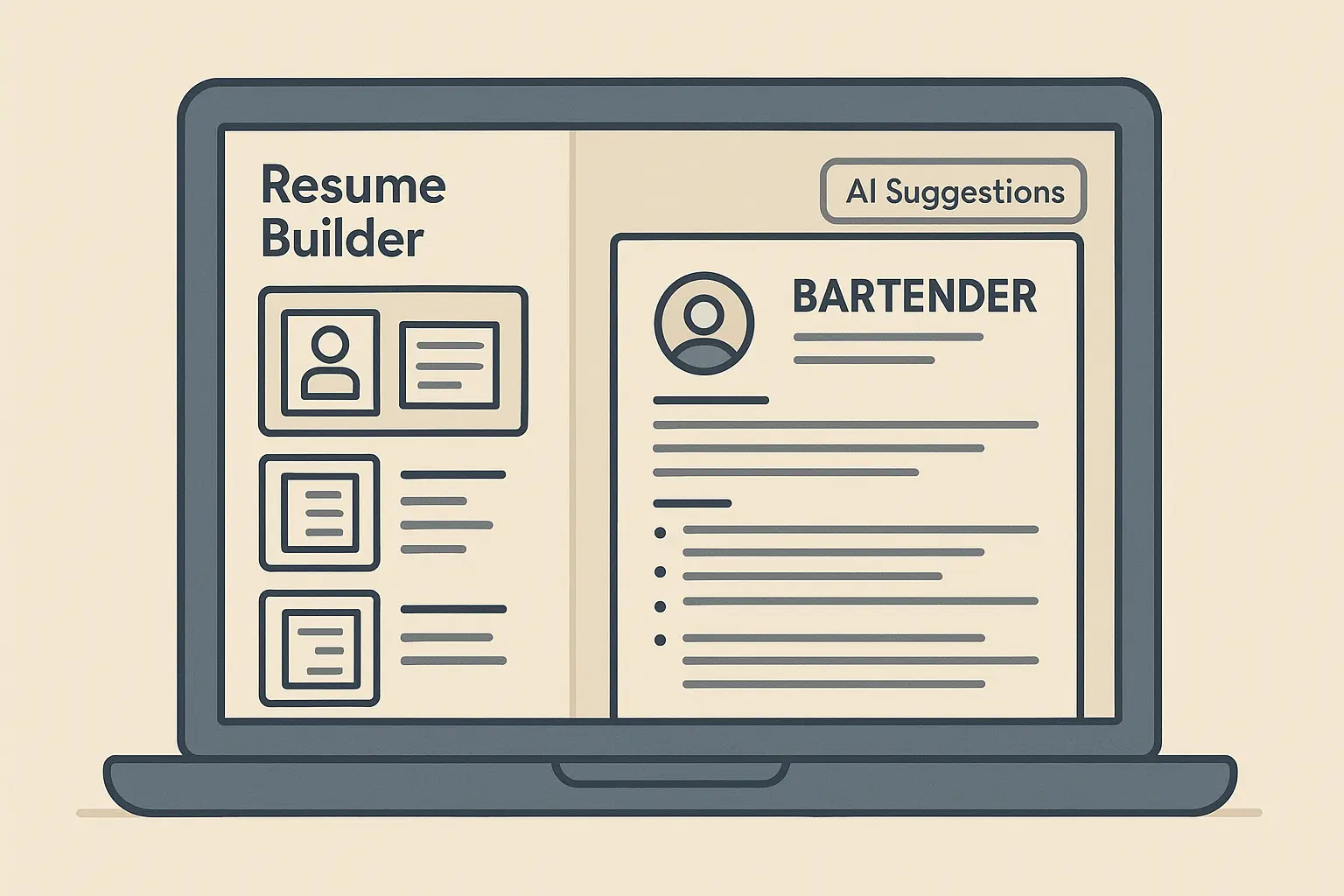25 Top Bartender Resume Examples That Land Interviews Fast

Bartending is expected to see fast growth between 2021 and 2031, with an 18% increase (or over 90,000 new jobs) during that time, according to Resume Builder. I remember when I first started helping job seekers in the hospitality industry – one bartender told me they’d applied to dozens of positions without getting a single callback. The problem wasn’t their skills behind the bar; it was how they presented themselves on paper.
We’ve all been there – you know you’re good behind the bar, but your resume makes you sound like you’ve never mixed anything stronger than chocolate milk. Here’s the thing: your bartender resume is your first impression, and in a competitive field where employers receive hundreds of applications, you need examples that actually work. This comprehensive guide showcases 25 proven bartender resume examples across different experience levels and specialties, each designed to help you stand out and secure those crucial interviews.
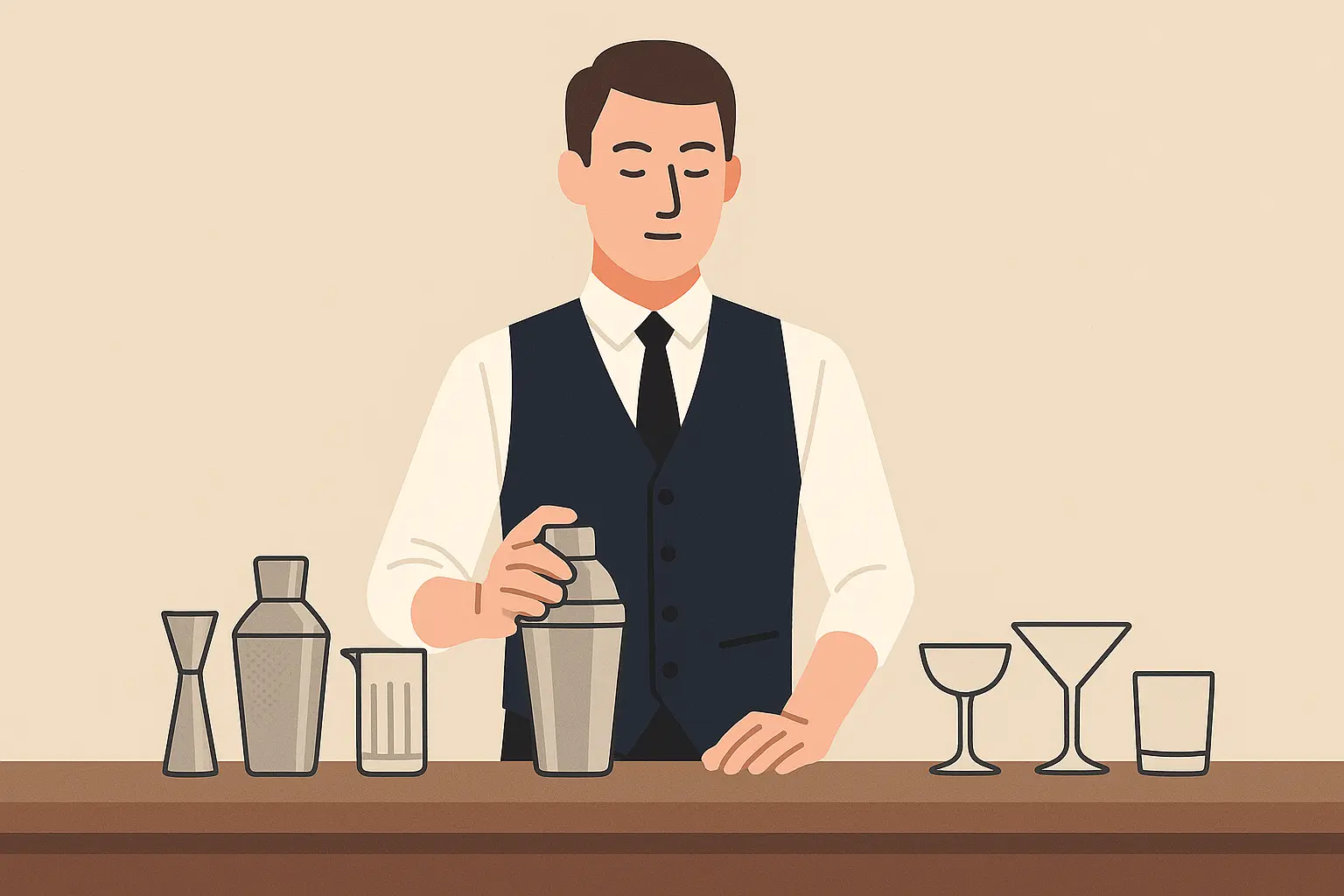
Table of Contents
-
TL;DR
-
What Makes a Winning Bartender Resume
-
Entry-Level Bartender Resume Examples
-
1. Recent Graduate with Customer Service Background
-
2. Career Changer from Retail
-
3. Part-Time Server Transitioning to Bartending
-
4. Hospitality Student with Internship Experience
-
5. Military Veteran Entering Civilian Bartending
-
-
Experienced Bartender Resume Examples
-
6. High-Volume Sports Bar Specialist
-
7. Craft Cocktail Specialist
-
8. Hotel Bar Professional
-
9. Restaurant Bar Manager
-
10. Nightclub Bartender
-
-
Specialized Bartender Resume Examples
-
11. Wine Bar Sommelier-Bartender
-
12. Brewery Taproom Specialist
-
13. Tiki Bar Specialist
-
14. Corporate Event Bartender
-
15. Cruise Ship Bartender
-
-
Management-Track Bartender Resume Examples
-
16. Assistant Bar Manager
-
17. Bar Operations Coordinator
-
18. Multi-Unit Bar Supervisor
-
19. Beverage Program Developer
-
-
Freelance/Contract Bartender Resume Examples
-
20. Mobile Bartending Service Owner
-
21. Freelance Event Specialist
-
22. Contract Bartender for Restaurant Groups
-
-
Bartender Server Combination Resume Examples
-
23. Restaurant Bartender-Server
-
24. Sports Bar Server-Bartender
-
25. Fine Dining Bartender-Server
-
-
Resume Evaluation Criteria That Actually Matter
-
How Resume Builder IQ Transforms Your Bartending Career
-
Final Thoughts
TL;DR
-
If you’re new to bartending, focus on showing you can handle people and learn fast – your customer service skills from retail or waiting tables actually matter more than you think
-
Been slinging drinks for years? Show them the numbers – how many drinks you can pump out per hour, how much you’ve boosted sales, how many customers you kept happy during those crazy Saturday night rushes
-
Got a specialty like wine knowledge or craft beer expertise? That’s your golden ticket to better pay – highlight those certifications and unique skills that set you apart from the basic beer-and-shot crowd
-
Want to move into management? Balance your bar skills with business smarts – show you can lead a team, manage inventory, and actually improve the bottom line
-
Skip the fancy fonts and creative layouts – most managers are reviewing resumes on their phones between shifts, and those computer systems that scan resumes first hate anything too creative
-
Freelance bartenders need to prove they’re reliable and can handle their own business – emphasize your professionalism and ability to adapt to different venues
-
If you can bartend AND serve tables, you’re gold – smaller places love versatility, and it usually means better money
What Makes a Winning Bartender Resume
Let’s be honest – most bartending resumes read like they were written by someone who’s never worked a shift in their life. The ones that actually get you interviews share some key things that make hiring managers think “okay, this person gets it.”
Here’s the deal: successful bartender resumes need to survive those computer systems that scan applications before human eyes ever see them. But they also need to speak to managers who’ve been in the weeds themselves and know what actually matters behind the bar.
When crafting your bartender resume, understanding professional resume format principles ensures your hospitality experience is presented in the most compelling way possible.
Here’s what actually works when you’re competing against 200 other people for that downtown cocktail bar job:
If you’re just starting out, focus on showing you can handle people and learn fast. Your customer service skills from that retail job? They translate. That time you managed a crazy Black Friday rush? That’s basically a Saturday night bar shift.
Got experience? Show them the numbers. Don’t just say you’re “fast” – tell them you can pump out 45 drinks an hour during peak times while keeping customers happy. Don’t just say you’re “good with people” – mention that you maintained a 98% customer satisfaction rating even during those nights when everyone’s three drinks deep and demanding complicated cocktails.
Going for management? They want to see you can balance hands-on skills with business smarts. Show them you increased sales, managed inventory, or trained new staff without the place falling apart.
Getting Past Those Computer Scanners
Look, those computer systems that scan resumes before humans see them? They’re looking for specific words. So if the job posting mentions “craft cocktails” three times, make sure that phrase shows up in your resume too. But don’t just stuff keywords everywhere – work them into your actual experience naturally.
Skip the creative layouts and fancy fonts. I know it’s tempting to stand out, but these systems hate anything too creative, and managers are usually reviewing resumes on their phones between shifts anyway. Clean, simple formatting wins every time.
What Actually Matters to Bar Managers
The strongest bartender resumes highlight both the technical stuff (knowing your cocktails, handling POS systems, managing inventory) and the people skills (dealing with difficult customers, working under pressure, being part of the team).
But here’s the key – don’t just list these skills. Show them in action. Instead of writing “good customer service skills,” describe how you “kept customers happy even during those crazy Saturday night rushes when the kitchen was backed up and everyone was getting cranky.”
Numbers Tell Your Story
Even if you’re just starting out, you can find numbers to include. Maybe you handled cash transactions worth $2,000 per shift, served 50+ customers during busy periods, or completed training programs with specific hour requirements.
For experienced bartenders, these numbers are your bread and butter: drinks served per hour, sales increases, customer satisfaction scores, inventory accuracy, team sizes you’ve managed. These concrete achievements help hiring managers understand what you can actually do for their business.
Entry-Level Bartender Resume Examples
So you want to bartend but don’t have bartending experience? Join the club. Every bartender started somewhere, and the good news is you probably have more relevant experience than you think. These examples show how to position your existing skills in ways that make bar managers think “this person could handle our bar.”
1. Recent Graduate with Customer Service Background
Maybe you’re tired of explaining why your philosophy degree qualifies you to make drinks, but here’s the thing – if you’ve got customer service experience and some hospitality education, you’re actually ahead of a lot of candidates.
Sarah Martinez – Recent Graduate Resume Summary:
“Recent hospitality management grad who’s been dealing with difficult customers for 3+ years in retail. Completed 120-hour mixology certification because I actually wanted to learn this stuff, not just wing it. Maintained a 4.9/5.0 customer satisfaction rating even during holiday retail madness. Fluent in Spanish, comfortable with POS systems, and genuinely excited about creating great experiences for people – even when they’re demanding and slightly drunk.”
The key here is connecting your education with real-world experience. Don’t just say you studied hospitality – explain how that retail job taught you to handle difficult people, work under pressure, and keep smiling when everything’s going wrong. Those are exactly the skills bar managers want.
Your coursework in beverage management or hospitality operations actually matters. It shows you understand the business side, not just the fun part of mixing drinks. Pair that with any customer service experience, and you’ve got a solid foundation.
2. Career Changer from Retail
Whether you’re trying to escape the corporate world or finally get out of that soul-crushing retail job, your experience dealing with customers, managing inventory, and working under pressure translates beautifully to bartending.
Retail management experience is actually excellent preparation for bar work. You’ve dealt with difficult customers, managed teams, handled cash, worked busy periods, and probably cleaned up more messes than you care to remember. Sound familiar?
The trick is reframing your retail experience in bar terms. Instead of “managed store inventory,” try “maintained accurate inventory levels and minimized waste during high-volume periods.” Instead of “provided customer service,” go with “resolved customer complaints and maintained positive relationships even during stressful situations.”
Your retail background gives you skills that a lot of bartenders lack – you understand the business side, you know how to upsell without being pushy, and you’ve probably developed thick skin when it comes to dealing with people having bad days.
3. Part-Time Server Transitioning to Bartending
If you’ve been serving tables, you’re already halfway there. You know restaurant operations, understand the pace, and have experience dealing with customers who’ve been drinking. The transition to bartending is really just learning the technical skills – the hard part (dealing with people) you’ve already mastered.
Your server experience gives you huge advantages. You understand how restaurants work, you know the difference between a good shift and a disaster, and you’ve probably already learned how to handle customers who’ve had a few too many.
Focus on your beverage knowledge from serving – maybe you’ve learned about wine pairings, beer styles, or cocktail recommendations. Even basic knowledge shows you’re already thinking like a bartender. Your familiarity with POS systems, ability to multitask, and experience with upselling are all directly transferable.
The best part? You already know if you actually like working in restaurants. That’s more than a lot of career changers can say.
4. Hospitality Student with Internship Experience
If you’re still in school but have internship experience, you can combine your theoretical knowledge with practical application. This shows employers you understand both the academic side and the reality of hospitality work.
Your coursework in beverage management, hospitality operations, or restaurant management provides credibility. You’re not just someone who thinks bartending looks fun – you’re someone who’s studying the industry seriously.
Internship experience, even if it wasn’t behind the bar, shows you understand hospitality culture. Maybe you worked front desk at a hotel, helped with catering events, or assisted with restaurant operations. All of these experiences demonstrate you understand customer service, teamwork, and the fast-paced nature of hospitality work.
Don’t undersell your academic projects either. If you developed a beverage cost analysis or created a cocktail menu as a class project, that shows initiative and business understanding that many experienced bartenders lack.
5. Military Veteran Entering Civilian Bartending
Military experience brings qualities that are incredibly valuable in bartending environments – discipline, ability to work under pressure, attention to detail, and reliability. The challenge is translating military experience into civilian hospitality terms.
Your military background gives you skills that many bartenders never develop. You understand teamwork, can follow procedures precisely, work well under pressure, and show up reliably. These might sound basic, but in an industry where people call out sick on busy nights, reliability is gold.
Focus on leadership experience, even if it was in a different context. Managing a team in the military translates to managing bar staff during busy shifts. Following safety protocols translates to responsible alcohol service. Working under pressure in high-stakes situations translates to handling Saturday night rushes.
The discipline and attention to detail that military service develops are exactly what managers want in bartenders. You’re not going to mess up drink recipes, you’ll follow procedures consistently, and you understand the importance of maintaining standards even when things get hectic.
Experienced Bartender Resume Examples
You’ve been doing this for a while, so your resume needs to prove you’re not just another bartender – you’re someone who makes a real difference to the business. These examples show how to turn your experience into compelling evidence that you’re worth hiring (and paying well).
6. High-Volume Sports Bar Specialist
If you can handle game day crowds without losing your mind or your accuracy, you’ve got skills that not every bartender possesses. High-volume environments separate the pros from the wannabes, and your resume should make that crystal clear.
When you’re slammed during the big game and still managing to keep everyone happy while pumping out drinks at lightning speed, that’s a specific skill set. Don’t just say you’re “fast” – show them the numbers. Serving 150+ customers per shift while maintaining 98% accuracy and hitting $2,000+ in daily sales tells the whole story.
Key achievements that matter:
-
Maintained 45+ drinks per hour during peak periods (because speed without accuracy means nothing)
-
Implemented systems that reduced wait times by 30% (you made the operation better, not just survived it)
-
Trained 8 junior bartenders (you can teach others to handle the chaos too)
-
Achieved lowest spillage rate on team (you don’t waste product even when things are crazy)
The ability to stay calm when everyone around you is losing their minds during overtime is exactly what managers need. If you can handle the Super Bowl crowd, you can handle anything they throw at you.
7. Craft Cocktail Specialist
Craft cocktail bartending is a different beast entirely. You’re part chemist, part artist, part business person. Your resume needs to show you can create amazing drinks that people are willing to pay premium prices for.
Marcus Chen – Craft Cocktail Specialist Achievement:
“Developed 15+ signature cocktails for upscale lounge, including award-winning ‘Smoke & Mirrors’ that became the top-selling drink and boosted premium spirit sales by 40%. Created seasonal menus featuring house-made syrups and bitters, which increased average check size by 25% and got us featured in the local food & beverage magazine. Managed $50,000+ premium inventory with zero shrinkage because I actually care about the expensive stuff.”
This isn’t about making drinks fast – it’s about making drinks that justify $15+ price tags. Your ability to create original recipes, work with premium ingredients, and educate customers about what they’re drinking translates directly to higher profits.
Focus on your creative achievements: original cocktails you’ve developed, seasonal menus you’ve created, premium spirit knowledge, and most importantly, how your expertise translates to higher sales and customer satisfaction.
8. Hotel Bar Professional
Hotel bartending requires a different skill set – you’re dealing with international guests, business travelers, and people who expect a certain level of sophistication. Your resume should reflect cultural awareness and ability to provide personalized service.
Key aspects include maintaining high guest satisfaction ratings across diverse clientele, managing VIP events and private parties, cross-training in multiple hotel areas, and developing relationships with repeat business travelers who might become regulars.
Your multilingual abilities and cultural sensitivity are huge assets. Being able to recommend local attractions, accommodate dietary restrictions, or simply make someone feel welcome when they’re far from home – these soft skills matter as much as your cocktail knowledge.
Hotel bars also mean working with different departments, handling room service orders, and maintaining brand standards. Show that you understand hospitality extends beyond just making drinks.
9. Restaurant Bar Manager
When you’re managing both the bar operation and the people, your resume needs to show you can balance hands-on bartending with business responsibilities. This means demonstrating both your drink-making skills and your ability to run a profitable operation.
Key achievements include increasing bar revenue by 35%, managing teams of multiple staff members, implementing cost control measures that actually work, and maintaining perfect compliance records (because nobody wants to deal with licensing issues).
Your progression from bartender to management shows employers you understand the business from the ground up. You know what it’s like to be in the weeds, so you can manage staff effectively. You understand costs because you’ve seen how waste affects the bottom line.
Focus on concrete business improvements you’ve made: reduced costs, increased sales, improved efficiency, better staff retention. These numbers show you’re thinking beyond just making drinks.
10. Nightclub Bartender
Nightclub bartending is its own special kind of chaos. If you can maintain quality service when the music is pounding, the crowd is three deep, and everyone wants their drinks five minutes ago, you’ve got skills that translate to any high-pressure environment.
The numbers that matter: serving 300+ customers per night, maintaining 45+ drinks per hour during peak times, and achieving the lowest spillage rate while everything around you is madness. Your ability to coordinate with DJs, security, and event staff shows you understand nightclub operations beyond just the bar.
Nightclub experience also demonstrates incredible stamina and ability to maintain energy throughout long shifts. Your crowd management skills and ability to spot potential problems before they escalate are valuable in any hospitality environment.
The entertainment aspect matters too – you’re not just serving drinks, you’re part of creating the overall experience. Your collaboration with entertainment staff and understanding of how bar service fits into the bigger nightlife picture shows strategic thinking.
Specialized Bartender Resume Examples
Here’s where you can really set yourself apart and command better money. Specialized bartenders with niche expertise often earn 15-40% more than general bartenders because they bring knowledge that’s harder to replace.
When showcasing specialized bartending skills, understanding how to effectively highlight hard skills on your resume can significantly differentiate your application from generic bartending candidates.
Here’s the real deal on specializations:
-
Wine bar sommelier work can get you 15-25% above base pay, but you need legit certifications
-
Brewery specialists with Cicerone credentials typically see 10-20% premiums
-
Craft cocktail experts can command 20-30% more, especially in upscale markets
-
Corporate event bartenders often make 25-40% above standard rates because clients pay premium prices
11. Wine Bar Sommelier-Bartender
Wine expertise is where serious money lives. If you’ve got Court of Master Sommeliers credentials and can actually talk wine without sounding pretentious, you’re in a different league entirely.
Your Level 2 sommelier certification isn’t just a piece of paper – it represents hundreds of hours of study and tasting that most bartenders never invest. When you can recommend perfect pairings, educate customers without talking down to them, and manage a $75,000 wine inventory with 99% accuracy, you’re providing value that justifies premium pricing.
Key achievements that matter: increasing wine sales by 45% through education (not pushy sales), conducting monthly wine classes that build customer loyalty, and achieving Wine Spectator recognition for your wine program. You’re not just serving wine – you’re creating experiences that people remember and talk about.
The business impact is what gets you hired: customers spend more when they trust your recommendations, they come back for wines you’ve introduced them to, and they bring friends to experience your expertise.
12. Brewery Taproom Specialist
Craft beer knowledge goes way beyond knowing the difference between an IPA and a lager. If you’ve got Cicerone certification and understand brewing processes, beer styles, and food pairings, you’re bringing expertise that enhances the entire brewery experience.
Your ability to conduct engaging brewery tours, explain brewing processes in accessible terms, and help customers discover new styles they’ll love translates directly to higher sales and customer loyalty. Managing rotation for 20+ house-brewed beers requires understanding flavor profiles, seasonal availability, and customer preferences.
The education component is huge – when you can explain why a particular beer pairs well with their food choice or help them understand what makes a sour beer work, you’re adding value that customers appreciate and remember.
Focus on tour satisfaction ratings, increases in flight sales through education, and your role in developing beer pairing menus that boost both beverage and food sales.
13. Tiki Bar Specialist
Tiki bartending is pure theater combined with serious rum knowledge. If you can create Instagram-worthy presentations while knowing your way around 20+ rum varieties and exotic ingredients, you’re tapping into a niche that commands premium prices.
Your 20+ original tiki recipes aren’t just drinks – they’re experiences. When you increase social media followers by 300% through killer drink photography and achieve consistently high ratings for presentation, you’re driving business in ways that traditional bartending doesn’t.
The entertainment value matters as much as the drink quality. Your understanding of tiki culture, ability to create elaborate garnish presentations, and skill at building the theatrical experience that tiki bars are known for sets you apart from bartenders who just follow recipes.
14. Corporate Event Bartender
Corporate event work is where reliable professionals make serious money. If you can handle high-end corporate clients, maintain professionalism during long events, and adapt to various venue types, you’re in a premium market.
Your track record of 150+ successful events with 98% client satisfaction demonstrates reliability that corporate clients pay premium rates for. Managing operations for 500+ person events requires logistics skills, professional presentation, and ability to maintain service quality under pressure.
The licensing and insurance requirements show you understand the business side. Corporate clients need bartenders who are fully professional, properly insured, and can handle their events without any surprises or problems.
15. Cruise Ship Bartender
International cruise experience demonstrates cultural adaptability and ability to maintain service standards during extended voyages with diverse clientele. Serving 2,000+ passengers while maintaining high satisfaction ratings across multiple voyages shows incredible stamina and consistency.
Your international experience and multiple language abilities make you valuable for any venue serving diverse clientele. The maritime certifications and understanding of shipboard operations demonstrate adaptability and professional development.
Managing inventory for extended cruise segments without resupply opportunities requires planning and accuracy skills that translate to any bar operation. Your experience with international guests and cultural sensitivity are increasingly valuable in diverse markets.
Management-Track Bartender Resume Examples
Moving from bartender to management means showing you can balance making great drinks with running a profitable business. These examples demonstrate progression from hands-on bartending to leadership and strategic thinking.
16. Assistant Bar Manager
Assistant managers bridge the gap between bartending and full management. You’re still making drinks during busy shifts, but you’re also handling schedules, training staff, and solving operational problems.
Your ability to supervise teams of 14+ staff members while maintaining hands-on bartending skills shows you haven’t lost touch with the floor. Implementing training programs that reduce onboarding time from 3 weeks to 10 days demonstrates efficiency improvements that save money.
The workflow optimization and inventory accuracy improvements show strategic thinking beyond just managing people. You’re making the operation better, not just maintaining the status quo.
17. Bar Operations Coordinator
Operations coordinators focus on the business side while maintaining bartending expertise. This role is about systems, efficiency, and making the numbers work better.
Jennifer Rodriguez – Bar Operations Coordinator Impact:
“Implemented new inventory management system across 3 locations, reducing waste by 22% and saving $18,000 annually. Negotiated vendor contracts that decreased beverage costs by 8% while maintaining quality standards. Developed standardized training materials used company-wide, reducing new hire onboarding time from 3 weeks to 10 days.”
Your analytical skills and systems thinking separate you from bartenders who just focus on drink-making. The cost reduction through vendor negotiations and technology implementation shows business acumen that justifies management-level compensation.
18. Multi-Unit Bar Supervisor
Managing multiple locations requires consistency, standardization, and ability to maintain quality across diverse venues. Your experience overseeing 4 locations while increasing average sales across all venues demonstrates scalability and leadership.
The development of standardized training materials used company-wide shows you can think beyond individual venues. Your focus on brand consistency and quality control across multiple locations demonstrates strategic thinking about growth and operations.
19. Beverage Program Developer
Program developers combine creative bartending skills with business strategy. You’re creating profitable beverage programs that drive revenue while maintaining cost control.
Your role in developing programs for multiple restaurant openings, creating seasonal menus that increase revenue by 30%, and conducting advanced staff training shows both creativity and business impact. Recipe optimization that reduces costs while maintaining quality demonstrates strategic thinking about profitability.
Freelance/Contract Bartender Resume Examples
Freelance bartending means you’re running your own business while providing exceptional service. These resumes need to show both bartending skills and business acumen.
20. Mobile Bartending Service Owner
Running a mobile bartending service means you’re part bartender, part business owner, part logistics coordinator. Your 100+ events annually with 200+ repeat customers shows both service quality and business development skills.
The $75,000 annual revenue with healthy profit margins demonstrates you understand pricing, cost control, and customer acquisition. Your perfect safety record and proper licensing show professionalism that high-end clients require.
21. Freelance Event Specialist
High-end event work requires discretion, adaptability, and ability to manage teams for large events. Your experience with celebrity and VIP events, managing teams of 12+ bartenders, and maintaining perfect safety records shows high-level capabilities.
Relationships with premium event planning companies demonstrate business development skills and industry connections that lead to consistent work.
22. Contract Bartender for Restaurant Groups
Contract work for restaurant groups requires exceptional adaptability and consistency. Your experience providing coverage for 15+ locations while maintaining service standards across diverse venues shows flexibility and reliability.
The positive feedback from multiple venue managers and ability to quickly integrate into existing teams demonstrates professionalism and adaptability that restaurant groups value.
Bartender Server Combination Resume Examples
Dual-role capabilities make you incredibly valuable, especially to smaller establishments. These resumes show how versatility translates to better opportunities and higher pay.
Here’s why dual roles matter:
-
Small restaurants love the coverage flexibility during varying business levels
-
Sports bars need people who can handle both areas during game day chaos
-
Fine dining values the enhanced guest experience from seamless service
-
You typically earn 8-25% more than single-role positions
23. Restaurant Bartender-Server
Restaurant bartender-servers maximize revenue by providing seamless service across dining and bar areas. Your dual certifications and 25% higher check averages through effective upselling show how versatility benefits the bottom line.
Managing both table sections and bar service simultaneously during busy periods demonstrates exceptional multitasking abilities. Your cross-training capabilities provide operational flexibility that smaller restaurants especially value.
24. Sports Bar Server-Bartender
Sports bar environments during game days require exceptional multitasking and energy. Your ability to serve 50+ customers during major events while maintaining high accuracy across both service areas shows you can handle their busiest periods.
The cross-selling success and ability to maintain accuracy under pressure demonstrate skills that translate to higher revenue and customer satisfaction during peak periods.
25. Fine Dining Bartender-Server
Fine dining requires sophistication and extensive knowledge of both food and beverage service. Your advanced wine certifications and high average check sizes through expert recommendations show expertise that justifies premium pricing.
Bilingual abilities and successful management of wine dinners and special events demonstrate the sophistication and cultural awareness that upscale establishments require.
Resume Evaluation Criteria That Actually Matter
Here’s what hiring managers are really looking for when they’re scanning through dozens of bartender resumes. Understanding these criteria helps you create a resume that actually gets noticed instead of ending up in the digital trash pile.
For bartenders seeking to maximize their interview potential, understanding what to put on your resume becomes crucial when competing against hundreds of other hospitality professionals for the same positions.
Getting Past the Computer Gatekeepers
Those computer systems that scan resumes before humans see them are looking for specific things. Clean formatting with standard section headers (Experience, Skills, Education) works way better than creative layouts that confuse the software.
Keyword optimization matters, but don’t just stuff them everywhere. If the job posting mentions “craft cocktails,” “inventory management,” and “customer service” multiple times, work those phrases naturally into your experience descriptions. The computer needs to see them, but humans need them to make sense.
Skip the fancy graphics, unusual fonts, or creative layouts. I know it’s tempting to stand out, but these systems hate anything too creative, and most managers are reviewing resumes on their phones between shifts anyway.
Skills That Actually Impress
Stop putting “detail-oriented” on your resume. Every bartender is detail-oriented – mess up someone’s drink order and you’ll hear about it real quick. Instead, show your attention to detail through specific examples.
Instead of listing “customer service,” describe how you “kept customers happy even during those crazy Saturday night rushes when the kitchen was backed up and everyone was getting cranky.” Instead of “fast-paced environment,” try “maintained 45+ drinks per hour service rate during peak weekend shifts.”
Industry certifications matter more than generic skills lists. WSET wine certifications, Cicerone beer credentials, ServSafe certification, or specialized mixology training show you’ve invested in your craft beyond just showing up to work.
Numbers That Tell Your Story
Even if you’re just starting out, find numbers to include. Maybe you completed 40 hours of training, handled cash transactions worth $2,000 per shift, or served 50+ customers during busy periods.
For experienced bartenders, these metrics are your bread and butter:
-
Drinks served per hour during peak times
-
Sales increases you’ve contributed to
-
Customer satisfaction ratings or repeat customer percentages
-
Inventory accuracy rates
-
Team sizes you’ve managed or trained
-
Cost reductions you’ve achieved
What Managers Actually Care About
Bar managers have usually been in the weeds themselves. They know the difference between someone who can handle the pressure and someone who’ll crack during the Saturday night rush.
They want to see evidence you can:
-
Handle difficult customers without creating bigger problems
-
Work efficiently under pressure without sacrificing quality
-
Show up reliably (seriously, this is huge in hospitality)
-
Work well with the team instead of creating drama
-
Learn quickly and adapt to their specific systems
-
Contribute to the business beyond just making drinks
How Resume Builder IQ Transforms Your Bartending Career
Look, creating a standout bartender resume shouldn’t feel like rocket science, but it does require understanding what actually works in today’s competitive hospitality market. Resume Builder IQ takes the guesswork out of the process with AI technology that understands bartending positions across different venue types.
Beyond just creating your bartender resume, understanding resume summary examples helps you craft compelling opening statements that immediately capture hiring managers’ attention in the competitive hospitality industry.
Whether you’re targeting high-volume sports bars, craft cocktail lounges, or upscale hotel bars, the platform ensures your resume includes the specific keywords and phrases that hiring managers and those computer screening systems actually look for.
The mobile-friendly setup works with bartenders’ crazy schedules – you can work on your resume during commutes, breaks, or whenever you have spare time. The hospitality-focused templates highlight both your technical skills (cocktail prep, inventory control) and people skills (customer service, multitasking) in ways that make sense to bar managers.
Instead of generic advice, you get industry-specific suggestions that help you quantify your impact effectively. The AI transforms basic descriptions into compelling achievements – turning “served drinks quickly” into “maintained 45+ drinks per hour service rate during peak weekend shifts.”
The ATS-friendly design ensures your bartending experience actually reaches decision-makers by passing those automated screenings while still looking professional to human reviewers. This dual optimization maximizes your chances of landing interviews at restaurants, hotels, and hospitality groups using modern screening technology.
Final Thoughts
Your bartender resume is your ticket to better opportunities in an industry that’s always hiring but rarely hiring well. The 25 examples in this guide show that successful resumes go way beyond listing where you’ve worked – they tell stories about what you’ve accomplished and how you’ve made a difference.
As you craft your bartender resume, remember that understanding customer service skills for your resume becomes essential since exceptional guest service forms the foundation of successful bartending careers across all venue types.
Whether you’re trying to escape that soul-crushing retail job, move up from serving tables, or finally get out of that sports bar where drunk fans throw nachos, the key is showing employers you understand what bartending is really about – creating great experiences for people while contributing to a profitable business.
Don’t undersell yourself. That three-week stint at your cousin’s restaurant? It counts, even if it felt like chaos at the time. Your retail experience dealing with difficult customers? That translates perfectly to handling people who’ve had a few too many. Your ability to stay calm under pressure? That’s exactly what managers need during Saturday night rushes.
But also don’t oversell yourself. If you’ve never bartended before, don’t claim you’re a “mixology expert” because you watched some YouTube videos. Be honest about your experience level while emphasizing your relevant skills and genuine enthusiasm for the industry.
The hospitality field rewards people who combine technical skills with genuine care for creating great experiences. Your resume should reflect both your bartending abilities and your understanding of what makes each venue type unique. Whether it’s high-volume efficiency, craft cocktail creativity, or sophisticated wine service, show employers you get what makes their place special.
Take time to study these examples, adapt the strategies that fit your background, and create a resume that opens doors to your next opportunity. Remember – you’re not just applying for a job, you’re positioning yourself as someone who can make their operation better.
The industry keeps evolving with new cocktail trends, technology integration, and changing customer expectations. Your resume should show you’re someone who adapts to these changes and contributes to business success, not just someone who shows up and follows recipes.
Most importantly, don’t let a weak resume hold you back from opportunities you deserve. You’ve got skills that translate beyond the bar – problem-solving, multitasking, grace under pressure, and ability to make people happy even when they’re having bad days. Make sure your resume tells that story in a way that gets you in the door.
Whether you’re crafting your first bartender resume or updating an existing one, focus on results that matter to employers: happy customers, increased sales, smooth operations, and being someone the team can count on. The right opportunity is out there – your resume just needs to help you find it.

